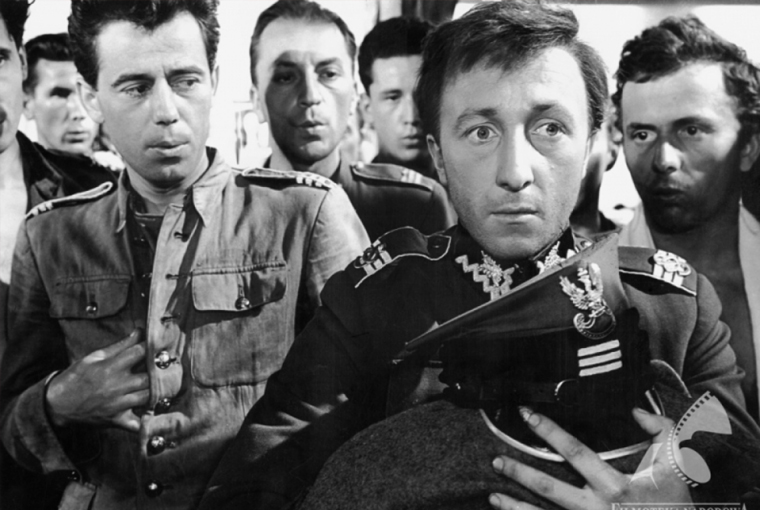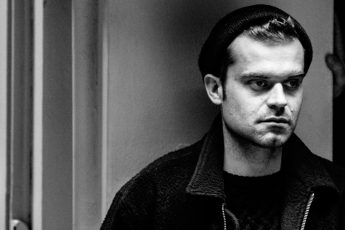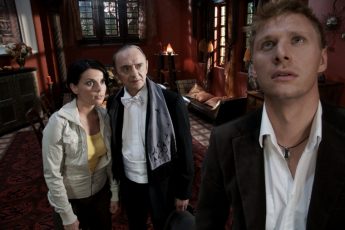Little Man, Big Trouble
Andrzej Munk’s Bad Luck (Zezowate szczęście, 1960)
Vol. 34 (October 2013) by Julia Zelman
To the scholar Dina Iordanova, the Polish director Andrzej Munk belonged to a movement in East Central European film that expressed the “burden of history.”1 She continued that like his compatriot Andrzej Wajda or the Hungarian István Szabó (one could also add the Czechoslovaks Jaromil Jireš and Jiří Menzel), Munk made films depicting the individual at odds with history, attempting to “outsmart” the mass movements that lead to war and repression. The tragi-comedy Bad Luck (Zezowate szczęście, 1960) plants its feet squarely on this individualistic ground: it is the story told in first-person flashback of the unprepossessing Jan Piszczyk, who recounts the story of the “bad luck” that has always dogged his life. Early in the narrative, the viewer will begin wondering whether fortune is truly set against Jan, or whether he in fact possesses the luck of a Harold Lloyd, drastically misinterpreting every possible situation yet somehow surviving all of his cleverer, braver or more noble compatriots.
The man of moral compromise and the hapless plaything of fate are familiar figures in the East Central European film landscape. For the first, we can look to Colonel Redl in Szabo’s film of that title (1985), a homosexual outcast who carves himself a niche in society through betrayal (Iordanova cites Redl as a victim of “the uneven match between the individual and history”2), or the protagonist of Andrzej Wajda’s Danton (1983). Jan Piszczyk in Bad Luck is a scaled-down and far less noble version of these men, whose goals can be reduced to finding a girlfriend, wearing a smart uniform and acquiring lots of money. Like the mythic Soldier Švejk of Czech literature, he chooses precisely the wrong strategy in any given situation, but he lacks the comically steadfast loyalty of Švejk even while sharing his total incomprehension of the course of history.
The middle-aged Piszczyk begins his sad tale with a flashback to his childhood, which plays as a slapstick silent film, complete with Chaplinesque sound effects. Already, the little Jan, humble son of a tailor, wants nothing better than to belong to a group (in this case, the scouts) that will supply him with a uniform and a bugle, but the malicious jealousy of a classmate ruins his chances. This episode is the only one in which Piszczyk is truly a victim of outside circumstances rather than his own machinations. However, it does provide a psychological background for this richly comic character and his all-consuming and futile drive for social advancement.
The next, considerably darker episode finds Piszczyk a student at the university, where, as he explains in voice-over, his large nose makes him the target of anti-Semitic thugs. Later, thanks to the help of a nationalist association, he becomes a tutor to an army officer’s beautiful daughter, Jola, who promptly seduces him. While attempting to sneak to a tryst with her, Piszczyk is coerced into a pro-war rally (for an attack on Kaunas, Lithuania). The first-person narration explains:
All I could think of was getting rid of my protest sign and getting out of there. Suddenly, I found myself in the middle of the protest. I hadn’t realized we had so many enthusiasts. I was caught up in the atmosphere and yet I didn’t care one bit about Kaunas.
I realized they weren’t our people. Now I didn’t know what to shout. With my nose, they could mistake me for a Jew. I started shouting slogans from one side, then the other.
Piszczyk lacks the malice as well as the brains to profit from politics, and it makes for a rather strange viewing experience to realize that, try as one may, one cannot hate him. Partly, this is thanks to Bogumil Kobiela’s ingenious performance, in which he demonstrates a full range of comically bad behavior while retaining the same air of naive dismay: lying, wheedling, snivelling, boasting, and generally staggering under the weight of the tasks he foolishly undertakes. He possesses Charlie Chaplin’s cinematic innocence, but seems to have been born without an instinct for altruism. He is a simple soul who survives some of the twentieth century’s worst calamities because of, rather than in spite of his ineptitude.
Yet his tragedy is not so much his base nature but rather the fact that he is never recognized for his true self – whether or not he desires to be. He is mistaken, after being taken for a Jew, for a nationalist and an anti-Semite, for a war hero, a Fascist spy, a Resistant, a Western spy, an ardent Communist and a reactionary saboteur. The episode in which he impersonates a Resistance member to impress a beautiful compatriot turns unexpectedly melancholic when the girl falls in love with him. “Why are you looking at me like that? I’m ugly and uninteresting,” he asks her plaintively. “You’ve mistaken me for somebody important.” For a short time, it appears as if the film may change tack. Piszczyk seems on the verge of really joining a Resistance group to merit Barbara’s admiration. But a further humiliation sets him spinning off into another city and identity.
The final part of the film takes another unexpected turn into broad satire, as this middle-aged nobody of middling intelligence suddenly becomes an important man in the new Socialist regime. His talent for flattery and overpowering conformist instinct makes him a perfect candidate for high government functions. It is only at this point that Piszczyk truly becomes a despicable character. He develops mannerisms hearkening back to silent film villains, rubbing his hands together and cackling with a mouth full of blackened teeth. But even this does not last, as Piszczyk’s excessive enthusiasm disconcerts even the most ardent ideologue.
If Bad Luck dramatizes the individual’s brush with history as Iordanova posits, the film implies that Piszczyk is the anti-hero of his time. Incapable of idealism or ideology, he reflects the bewilderment of finding one’s place in a constantly changing order and the terror of living in constant uncertainty. The comedy is at times broad, the shifts in tone sometimes startling; the film’s irony is nonetheless full of ambiguity and compassion for those not “important” enough to take part in history.




Leave a Comment